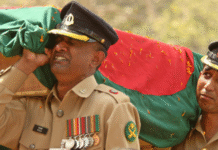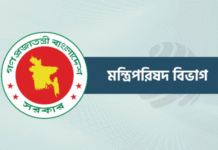
“ARSA operatives are engaged in a wide array of crimes in the camps … The Rohingyas know their faces but they are too afraid to say anything publicly.”
All the 34 Rohingya camps in Cox’s Bazar have become hubs of organised and cross-border crimes. And it is the Arakan Rohingya Solidarity Army (ARSA) that is behind it all, say Rohingyas and intelligence sources.
Out to make the refugee camps its stronghold, the armed group is cashing in on lax law enforcement and the misery of the refugees.
After the killing of Rohingya leader Mohib Ullah and the six Rohingya men in October, the ARSA tightened its clutches even further, and the camp dwellers appear to have resigned themselves to fate: Fear and plight are not going to cease stalking them anytime soon.
“ARSA operatives are engaged in a wide array of crimes in the camps. They take absolute control of the camps at nighttime. The Rohingyas know their faces but they are too afraid to say anything publicly,” Habib Ullah, brother of Mohib Ullah, told The Daily Star.
Echoing him, Noor Mohammad, another refugee, said the ARSA controls everything, from drug trafficking to extorting to hoarding relief goods. “There is no one to confront them and now they have established a tight grip on the camps.”
However, the government and law enforcers maintain that the Rohingya insurgent group does not exist in Bangladesh and that some criminals might have falsely identified themselves as ARSA operatives to intimidate the general refugees.
“There is no ARSA presence in the camps. Those who say otherwise should be identified. It’s a blatant lie. They have an evil agenda to portray the Rohingyas as criminals,” said Naimul Haque, commander of 14th Armed Police Battalion (APBn), which is in charge of law enforcement at a portion of tRohingya camps.
The Rohingyas need to go out of the camps for medical purposes and to receive relief goods, he said. “Some of them take advantage of this and engage in drug dealing. We even recovered yaba even from their stomach.”
Former foreign secretary Touhid Hossain believes that one of the reasons why the government officials refute the existence of ARSA in Cox’s Bazar is for the interest of the repatriation of refugees. “As far as I know, Myanmar says there are many terrorists among Rohingyas and the country doesn’t want to take them back. But Bangladesh maintains that there is no ARSA in the camps.”
Prof Shahab Enam Khan of Jahangirnagar University’s Department of International Relations said external forces that are against Rohingya repatriation are backing the insurgent group.
On August 25, 2017, ARSA claimed responsibility for attacks on police posts across northern Rakhine. The Myanmar military used the attacks as a pretext for carrying out a massive clampdown on Rohingyas, resulting in the region’s most severe refugee crisis in decades.
Rohingya sources believe ARSA members killed Mohib Ullah and the six others to thwart the repatriation process and to send out a message of their strength as they seek to be a party to formal repatriation talks.
Besides drugs and human trafficking, extortion is a major source of money for the ARSA men.
They make around 15,000 shops pay them every week. Rohingya sources said there are around 500 madrasas in the camps. Most of the madrasas are controlled by an associate body of ARSA known as the Ulama Council.
The other influential group is Islami Mahas, which used to be controlled by Mohib Ullah.
Islami Mahas is against all sorts of criminal activities and in favour of repatriation while the Ulama Council controls drugs and human trafficking.
Since the assassination of Mohib Ullah, more than 250 Rohingyas were arrested on criminal charges. At least 114 of them claim to be ARSA men, APBn officers said.
This correspondent talked to several dozen Rohingyas and their community leaders over the last few weeks. They spoke about ARSA on the condition of anonymity, as they fear reprisal by the group.
They said a huge number of ARSA members are agents of Myanmar and they get regular patronage from the Myanmar military.
“The ARSA operatives are working against repatriation as an agent of the Myanmar administration,” said a community leader.
ARSA members claimed to be fighting for the rights of the Rohingyas and many commoners trusted them initially. But now the Rohingyas believe that ARSA is working as the agent of the Myanmar government and obstructing their return to their homeland, said many of the Rohingyas.
“The situation is so frightening that we cannot say publicly that we want to return to our home. Those who are talking about repatriation are being killed,” said another community leader.
Popular leaders like the late Mohib Ullah, Arif Ullah, Abdur Rahim, Noor Alam, Hamid Ullah, and around 50 other Rohingya leaders have been killed since 2017. Family members of the assassinated leaders went into hiding fearing for their lives.
“ARSA is a terrorist organisation of the Myanmar government. They staged this drama and pushed one million Rohingyas to Bangladesh. Now they are trying to create obstacles to repatriation,” said a Rohingya man in Balukhali camp.
Major General (Retd) ANM Muniruzzaman, president of Bangladesh Institute of Peace and Security Studies (BIPSS), said the problem stems from various criminal activities and there is a growing nexus between criminal operatives in drug smuggling, small arms smuggling, and human trafficking.
WHAT IS ARSA?
ARSA, which operates in Rakhine state in northern Myanmar, grabbed international attention in 2016 when it attacked three police outposts in the Maungdaw and Rathedaung townships in Myanmar, killing nine officers.
ARSA leader Ataullah Abu Amar Jununi defended the attack and said that there have been various crimes and atrocities committed against the Rohingya for over 75 years, reported BBC.
He said ARSA carried out the attack to send a message that if the violence is not stopped, the ARSA has the right to defend itself. It said they are fighting on behalf of more than a million Rohingyas, who have been denied the most basic rights, including citizenship.
The Myanmar authorities said that the ARSA members are Muslim terrorists who want to impose Islamic rule.
The International Crisis Group (ICG) in a report in 2016 said the group was led by Rohingya people living in Saudi Arabia. The ICG says ARSA’s leader is Ata Ullah, who was born in Pakistan and raised in Saudi Arabia.
Although there are confusions about the location of Ataullah, Rohingyas believe that he lives in Arakan and he keeps regular contact with his followers from there.
Former foreign secretary Touhid Hossain said, “My opinion is that ARSA has been working for the Myanmar military all along. I have also expressed this on a number of occasions. I think Bangladesh should take this line rather than deny what is obvious. It should take the bull by the horns.”
Prof Shahab Enam Khan of Jahangirnagar University’s Department of International Relations said ARSA is a dubious outfit that fits more within a criminal profile than an ideology-oriented entity.
“It has morphed itself as a Rohingya brand with the backing of external forces not supportive of repatriation of the Rohingyas. One newly emerged entity can’t be a reason for Tatmadaw to embark on terminal cleaning of the Rohingyas that resulted in the expulsion of nearly a million Burmese people to Bangladesh. It’s common sense.”
Prof Khan, who works on the Rohingya issue, said the Myanmar narrative continues to label this dubious group as an extremist entity. Many fall into this narrative trap and find ARSA as an ideological representative of the Rohingyas, he added.
“The Tatmadaw discourse then aims to create an Islamophobic narrative which has its own appeal among vested interest groups. Hence, the ARSA actors that the Rohingyas see in the camps are multiple groups of thugs competing for resources under an ideological branding, more like using a franchise model of business, and therefore, serving the purpose against national and regional security and stability.”
The IR professor said a very small segment of Rohingyas may endorse ARSA activities out of ignorance, but it should not be seen as a generalised phenomenon.










